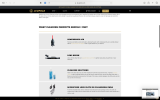You are using an out of date browser. It may not display this or other websites correctly.
You should upgrade or use an alternative browser.
You should upgrade or use an alternative browser.
Dangerous Game Scope
- Thread starter Beck
- Start date
Green Chile
AH legend
- Joined
- Feb 12, 2022
- Messages
- 4,755
- Reaction score
- 17,977
- Location
- DFW
- Website
- www.mattanjahuntingsafaris.com
- Media
- 140
- Member of
- NRA, GSCO
- Hunted
- Argentina, Saskatchewan, Eastern Cape, Limpopo, Zimbabwe, 30 US states and counting
Here is a good article by Leupold that talks about those products and the right (and wrong) way to clean optics.

 www.leupold.com
www.leupold.com

How To Clean A Riflescope | Leupold
Our optics are built for a lifetime of performance, guaranteed. But with all this extended use in rugged conditions, we know they are bound to get dirty. In...
Attachments
-
 Screenshot 2023-07-31 at 9.00.53 PM.png1.7 MB · Views: 116
Screenshot 2023-07-31 at 9.00.53 PM.png1.7 MB · Views: 116 -
 Screenshot 2023-07-31 at 9.00.54 PM.png548.8 KB · Views: 116
Screenshot 2023-07-31 at 9.00.54 PM.png548.8 KB · Views: 116 -
 Screenshot 2023-07-31 at 9.00.56 PM.png1.8 MB · Views: 110
Screenshot 2023-07-31 at 9.00.56 PM.png1.8 MB · Views: 110 -
 Screenshot 2023-07-31 at 9.00.57 PM.png572.5 KB · Views: 118
Screenshot 2023-07-31 at 9.00.57 PM.png572.5 KB · Views: 118 -
 Screenshot 2023-07-31 at 9.00.58 PM.png659 KB · Views: 126
Screenshot 2023-07-31 at 9.00.58 PM.png659 KB · Views: 126
I bought a Z3 3-10x42 and put it on my 7mm Mag. I’m initially very impressed!!! Pretty inexpensive at $800 too.Spot on for the Z3 as @rookhawk outlines. I have one and love it!
Green Chile
AH legend
- Joined
- Feb 12, 2022
- Messages
- 4,755
- Reaction score
- 17,977
- Location
- DFW
- Website
- www.mattanjahuntingsafaris.com
- Media
- 140
- Member of
- NRA, GSCO
- Hunted
- Argentina, Saskatchewan, Eastern Cape, Limpopo, Zimbabwe, 30 US states and counting
That's a very good scope and a good introduction to Swaro. Welcome to the dark side!
I have another Swarovski on my Remington Custom KS Mountain Rifle (Habicht 2.5-10), and a Kahles 3-9 on another Mountain Rifle. Love those scopes!!!That's a very good scope and a good introduction to Swaro. Welcome to the dark side!
WAB
AH ambassador
That's a very good scope and a good introduction to Swaro. Welcome to the dark side!
You’ve got that right. I began the Swaro adventure with a Z3 3-9x. I now have multiple Z6’s and a Z8, not to mention a couple of pair of bino’s. The Z3 is a gateway drug, beware!!!
Green Chile
AH legend
- Joined
- Feb 12, 2022
- Messages
- 4,755
- Reaction score
- 17,977
- Location
- DFW
- Website
- www.mattanjahuntingsafaris.com
- Media
- 140
- Member of
- NRA, GSCO
- Hunted
- Argentina, Saskatchewan, Eastern Cape, Limpopo, Zimbabwe, 30 US states and counting
Same thing for me. I got started with some lower end and now I've upgraded a lot of things and getting the reticles I like, etc. Glass is very important to me. Here's the truth...if your glass is good and you have decent to good fitness, you will be more successful as a hunter.
csmiffy
AH veteran
- Joined
- Dec 31, 2021
- Messages
- 104
- Reaction score
- 107
- Location
- Christchurch, New Zealand
- Hunted
- New Zealand
Not really on topic and only pertinent as some people like yourself have commented on cleaning scope lensesI am interested in those sprays, Do you have any product names? Thanks, brian
This is a proper cleaning method from a scope guru since retired in NZ.
Used to repair scopes and as he told me he sometimes before taking on certain models of scope, would request one from the manufacturer and pull it to bits for a bit of a look and assess if he wanted to have anything to do with it. This is a copy from his now defunct website as he wrote it.
Obviously only done at home of maybe at a well heeled camp if you have the gear
"Now that you own a fine set of optics, you should learn how to keep them in the best condition possible. One careless cleaning is all that it takes to scratch the lens coating and lens surfaces. Those scratches are PERMANENT! You don't get a second chance.
STEP ONE. This is the most important part (omit this and scratches are a certainty). Using a clean, stiff-bristled brush (pig bristle not synthetic), such as a 12mm high quality paint brush, work around the exterior lenses using a flicking action to lift off all traces of grit and dust. Don't worry if smears now appear on the surface: step two will take care of them. Blow hard on the lens to remove any loosened material. Examine the surfaces closely. Only when you are certain that no dust or grit remains proceed as follows.
STEP TWO. Select any of the following: Cigarette lighter fluid as used in "white-spirit" stoves; Clear alcohol; Methylated spirits; or proprietary lens cleaning fluid but not an ant-fogging solution. An interesting aside here: the CEO of Burris, when asked what solvent they used, told me acetone. Now, I too use acetone for many particular jobs, including cleaning of isolated lenses. What I must stress is: do not use acetone on your scope, binocular or cameras lenses because it can, and most probably will attack the seals or any plastic bodywork around the lens you are attempting to clean. Use one of the following (in descending order of preference: Commercial micro-fibre lens cleaning cloth; Commercial LENS tissue ( but not any substitute tissue such as toilet paper because there may be harsh fibres and/or high ash content incorporated); or flannelette pyjama material which MUST BE OLD so that all harsh fibres are long gone during the process of laundering. I repeat: Do not use toilet paper. Moisten the cloth or tissue with the approved solvent. Never pour fluid directly onto lens. Working quickly and gently, rub all over the lens surface before solvent evaporates. Select new tissue or fold cloth to a clean, dry part. Next, breathe onto the lens surface. This deposits, momentarily, a mist of distilled water. Wipe lens again, lightly, with a new tissue or dry part of the cloth.
JOB DONE - CLEAN LENSES.
SOME ADVICE. It is inevitable that foreign matter and raindrops etc. will accumulate on lenses when away in the field. Please RESIST THE TEMPTATION to use the shirt-tail or toilet paper on the spot. The particle of grit you didn't see under that raindrop will leave its calling card to remind you of your mistake from that time on. It is better to put up with temporary inconvenience than permanent reduction in optical performance. Solution? Well, DON'T RUB. Personally I will suck the corner of my handkerchief and then soak off each raindrop by capillary action. This may leave some watermarks (which will be taken care of on my return home) but makes the unit useable again with the precious lens coating undamaged. Snow is a great problem: get it off the lenses immediately. Try blowing it off with your breath. If you leave it on riflescope lenses it is very likely to cause sealing failure and a fogged-up scope. I hope this helps you to get the best out of your optics.
My final words on this subject concern Lens Pens. These have become very popular overseas with many writers extolling their effectiveness. At least some of these devices use a graphite powder to polish the surface. My feeling about them is negative for one simple reason. The cleaning surface is small and not cleanable in its own right. It will inevitably pick up dust and grit when being used, and, unlike a lens tissue which is used and then disposed of, or a micro fibre cloth which should be washed carefully and often, the lens pen will be overused until it causes the inevitable scratching. Then, it will be too late."
Members online
- Bigbore585
- SaintPanzer
- Major Bonkers
- 400Jeff
- CBH Australia
- Brickman301
- Mizzou100
- Riksa
- Killo
- LimbNoMo
- AustinM
- Charle1
- Sturgeondrjb
- ThreeJacks
- Radstorm
- BlackRhino
- HShunter
- DERIAN KOEKEMOER SAFARIS
- eyedok
- Rocked and Loaded
- Fishyroy
- Dieseljzanzibar
- Davidhurmond
- farrokhrt
- THAT'S AFRICA SAFARI
- pimes
- AfricaHunting.com
- sniper7
- jruby
- Mtn_Infantry
- Justin Peterson
- Billcollector
- Kharn
- DaBill
- Luminous Ham
- Monstermuley24
- Milo
- Tally-Ho HUNTING SAFARIS
- Safari Dave
- SWARA
- Rare Breed
- 375Fox
- Boyd Brooks
- Lou (Louis)
- Lion454
- BFaucett
- Franco
- Lopehunter
- Bob Nelson 35Whelen
- Flewis
Total: 87,650 (members: 1,114, guests: 86,536)
Forum statistics
Latest profile posts
Hi Paul,
This is Daniel from Mankazana Safaris.
I saw your post regarding a hunt in Africa. I am sure you have been bombarded with messages and replies from other outfitters, so I will keep this one quick.
I have a feeling we have exactly what you need for a first safari.
If you'd like to hear more, please don't hesitate to reach out.
Yours sincerely,
This is Daniel from Mankazana Safaris.
I saw your post regarding a hunt in Africa. I am sure you have been bombarded with messages and replies from other outfitters, so I will keep this one quick.
I have a feeling we have exactly what you need for a first safari.
If you'd like to hear more, please don't hesitate to reach out.
Yours sincerely,
If you ever decide to sell this rifle, I will buy it with the dies, bullet, brass, the works. Dan
American marketing tour update!
flights are booked Uber rides confirmed, car hire deposit paid! Hotels booked!
Im getting ready to go but first I have a 3 week photo Safari tour scouting some locations in the Limpopo province for future Photo safari tours! watch this space for awesome updates and footage !!!
Remember ISE Show 8-11 Jan in Denver Colorado!
Then from there I will be traveling by car for over a week
flights are booked Uber rides confirmed, car hire deposit paid! Hotels booked!
Im getting ready to go but first I have a 3 week photo Safari tour scouting some locations in the Limpopo province for future Photo safari tours! watch this space for awesome updates and footage !!!
Remember ISE Show 8-11 Jan in Denver Colorado!
Then from there I will be traveling by car for over a week